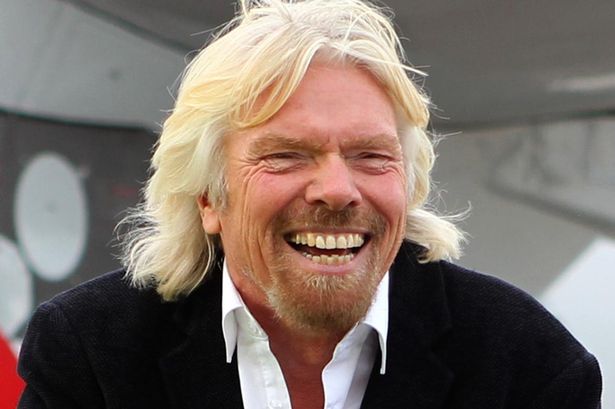Gradatim Ferociter (Step by step, ferociously)
Richard Branson’s Virgin Galactic space flight finally happened in 2021.

Sir Richard Branson
Last week, Virgin Galactic successfully launched its founder, Sir Richard Branson, and five other crew members into sub-orbital space in a milestone mission that marked the first fully crewed flight of its VSS Unity spacecraft. As he floated in zero-gravity in the spacecraft, Richard Branson said, “To all you kids out there – I was once a child with a dream, looking up to the stars. Now I’m an adult in a spaceship. If we can do this, just imagine what you can do.”
In an article titled: “3 Lessons I Learned from Richard Branson”, I detailed how I came across Virgin Galactic’s first setback many years ago. On November 1, 2014, barely four months after meeting Sir Richard Branson, I watched him on TV at the Mojave Desert, observing the wreckage of Virgin Galactic’s SpaceShipTwo which crashed, killing one pilot and severely injuring the other, casting huge doubts on Virgin’s space tourism programme. Questioned about the status of the mission after this fatal crash, Richard said “Yesterday we fell short, we’ll now comprehensively assess the results of the crash and are determined to learn from this and move forward.”
- Policeman detained for assaulting women, children in Abia
- Four cultists nabbed during supremacy battle in Ogun
Richard Branson’s Virgin Galactic space flight finally happened in 2021. The flight came nine days earlier than Blue Origin’s maiden flight which is scheduled for the 20th July 2021, led by the company’s billionaire founder Jeff Bezos. The Amazon founder is, like Branson also slated to rocket into suborbital space aboard his own company’s spacecraft. The two flights are landmark events for the commercial space industry. As an emerging sector, the space industry has for years been seeking to make suborbital space tourism a viable business with the aim of allowing thousands of people to experience the adrenaline rush and sweeping views of our home planet that such flights can offer.
Personally, the biggest inspiration in all this for me is neither the thrill of space tourism nor the business opportunity it spells for the globe. I am more fascinated by the dedicated and disciplined focus of these companies in truly exploring a new frontier with technology, money and imagination. I am intrigued by the fact that both entrepreneurs and their companies don’t advocate chasing after big breaks or overnight success. Instead, they urge us to settle in, to step ferociously forward, expecting full well that success might take a while.
Particularly, Jeff Bezos is probably the world’s greatest executer of this business philosophy of step by step dedicated action towards a common goal. Gradatim Ferociter is the latin motto of Bezos’s company Blue Origin. It means step by step, ferociously. According to Bezos, “Basically, you can’t skip steps, you have to put one foot in front of the other, things take time, there are no shortcuts, but you want to do those steps with passion and ferocity.”
These successful entrepreneurs demonstrate to the world the difference between having a dream and having a plan (step by step hard work that focuses on each small unit of progress). If you take Jeff’s Bezo’s empire of a company Amazon, which is a behemoth now known to be quite literally ‘the everything store’. It started with a single and indeed simple category, selling books and grew step by step, quite ferociously to rule the world of commerce.
From our government to private sector, I believe this is the one lesson in successful projects and business delivery that majority of Nigerians seem to completely overlook. We have such a strange fixation to overnight success and such debilitating lethargy towards dedicated, long-term work. We want everything to be instantaneous, grand and effortless.
Since we are talking about space, let’s think for a moment about Nigeria’s own space efforts. The National Space Research and Development Agency (NASRDA) and the Nigeria Communications Satellite (NIGCOMSAT) Limited are the two players leading Nigeria’s space efforts since the establishment of the former in 1999. Even in the United States, the private sector involvement in space would not have been possible without the decades long research and investment of the National Aeronautics and Space Administration (NASA). So these institutions are indeed visionary and pivotal towards developing our own space industry. However, almost all the science, technology and indeed innovation that should happen in these organisations seems to be continually outsourced. It is stunning that we have nothing to celebrate whether in ground breaking research or application but corruption allegations and inter-organisational squabbles between the two organizations.
It is certainly saddening that after two decades and spending billions of naira, we have no grounds for any researcher, innovator or indeed entrepreneur to take it step by step ferociously. I wonder why NASRDA is not spearheading any simple space exploration, even if it is near space photography. Why is NIGCOMSAT not leading any real and meaningful utilization (emphasis deliberate) of our already deployed satellites in various areas of application? Also, in an age of low-cost miniaturised satellites like CubeSat, why is there no government institution, university or company designing and launching any in Nigeria? I have had only few interactions with both organisations and I hope to establish direct contact soon as I plan to not only vigorously seek answers to these questions but also proffer simple, evidence-based solutions towards fixing this science, technology and innovation dysfunction.
